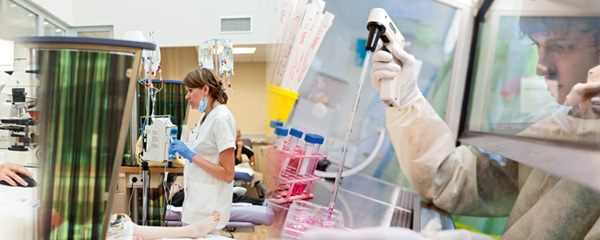A gene is a sequence (fragment) of DNA containing all the information needed to produce a protein or RNA.
Also see genotype and phenotype.

A gene is a sequence (fragment) of DNA containing all the information needed to produce a protein or RNA.
Also see genotype and phenotype.
The adjective "genetic" means “that which involves or which finds its source in genes”.
Genetics is the biological science devoted to the study of genes and heredity. Medical genetics is devoted to the identification of the mutations responsible for diseases like cancer, in order to understand and develop treatments. Genetic modifications and mutations can cause the transformation of a healthy cell into a cancerous one. Although most of these anomalies are acquired during the lifetime of a person, some mutations are present from birth and are hereditary.
The genome is all the genes of the chromosomes. It is the genetic heritage of an individual.
The word genome is the combination of the words “gene” and “chromosome”. It designates all the genetic information of an organism contained in each of its cells in the form of chromosomes.
The genome is a kind of encyclopaedia, the chromosomes are its different volumes and the genes are comparable to the sentences that compose it.
Genomics is the science which studies the genome.
Genomics comprises an ensemble of analyses that permit mapping, sequencing and analysing genomes.
Computer science plays a very important role in these analyses in the form of bioinformatics.
The genotype of an individual, or animal or plant organism, is all the genes that compose it.
Also see : gene, phenotype
Gastrointestinal stromal tumours or GIST are soft tissue sarcomas that mostly develop in the stomach, the small intestine or the large intestine, from cells lining the intestinal wall whose purpose is to regulate digestive motility. They are rare cancers (10% of sarcomas, less than 1% of cancerous digestive tumours).
The treatment of GIST has improved thanks to progress made in targeted therapies, notably tyrosine kinase inhibitors (TKI) that specifically block the cellular proliferation of GIST.
A glioblastoma, or grade IV astrocytoma, is a brain tumour that develops from cells of the central nervous system and which is generally located in the cerebral hemispheres. It is an aggressive cancer and poor prognoses affect 2,000 to 3,000 people every year in France, mainly adults. Research is concentrated on immunotherapy and placing electrodes on the patient’s scalp to improve treatments.